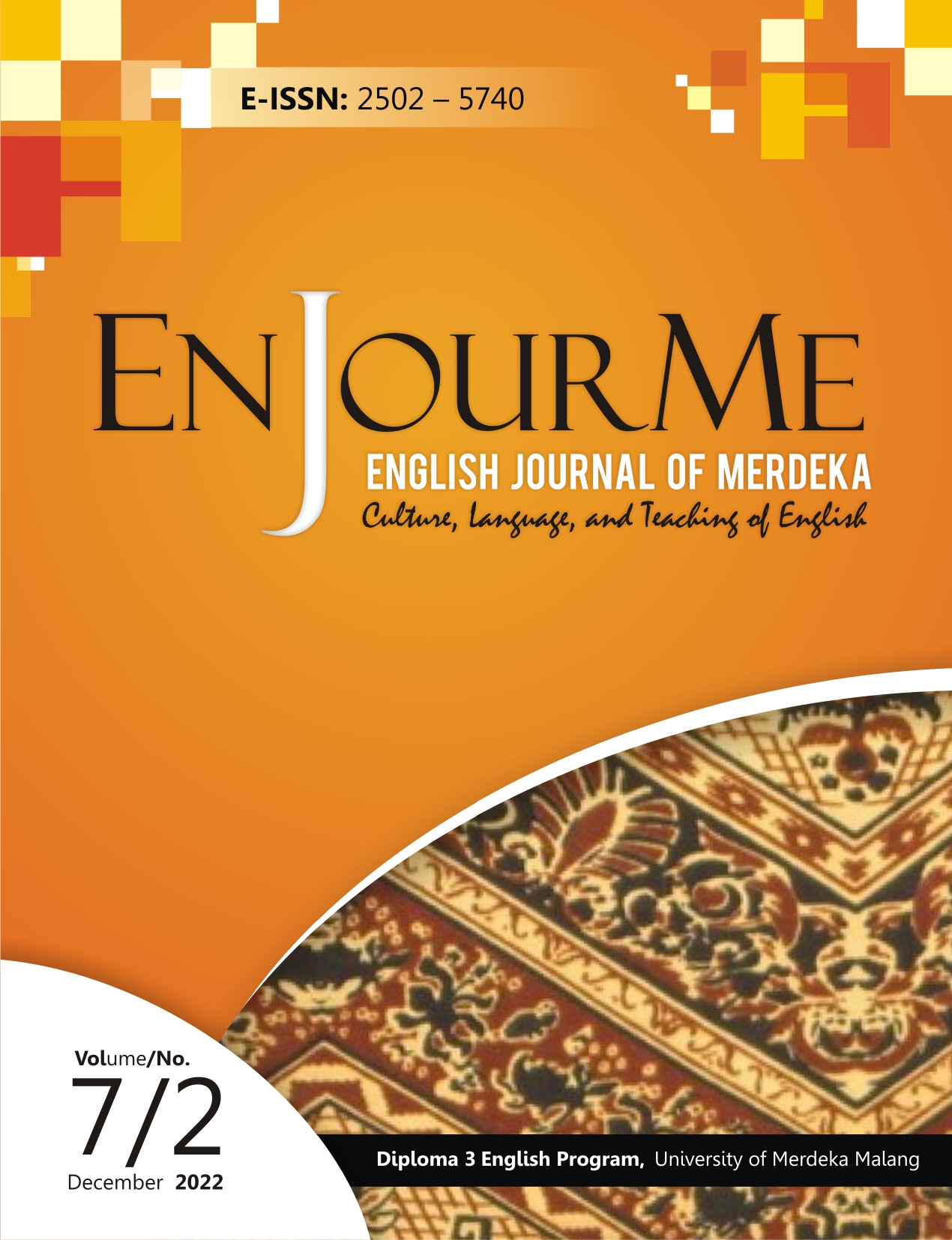Academic dishonesty in online English as a Foreign Language classroom
DOI:
https://doi.org/10.26905/enjourme.v7i2.8827Keywords:
Academic dishonesty, EFL classroom, online learningAbstract
In spite of studies about academic dishonesty that have been conducted by many researchers, only a small number of studies have investigated academic integrity in online EFL classrooms at university level. The aim of this research is to seek about the occurrence and types of academic dishonesty as well as strategies that could be used by English teachers to overcome the problem. This research investigated the reason why EFL students tend to carry out academic dishonesty in online learning. Researchers used open-ended questions to gain the students opinion and responses. Rresults of this research shows that 55.6% of the respondents understood what was considered to be academic dishonesty and in the same percentage they also sometimes conducted academic dishonesty. In exam related violations, 61.1% of them sometimes looked up information on the web to get helps or answers. In assignment related violation, 38.9% responded that they sometimes shared answers of the task and collaborated with others on individually assigned work. In online session related violations, 38.9% showed that sometimes they participated in a live session from one device and did other activities at the same time. Then, reasons why they did academic dishonesty was because the assignment was too difficult and they did not learn about the material well. All in all, most of the respondents understood about academic integrity, but they still tend to cheat. Thus, this study would help EFL students and teachers to maintain the academy integrity.
DOI:Â 10.26905/enjourme.v7i2.8827
Downloads
References
Akakandelwa, A., Jain, P., & Wamundila, S. (2013). Academic dishonesty: A comparative study of students of Library and Information Science in Botswana and Zambia. Journal of Information Ethics, 22(2), 141–154. https://doi.org/10.3172/JIE.22.2.137
Bacha, N. (2017). Research of EFL students’ Writing at two Lebanese English Medium Universities. Asian Journal of English Language Teaching, 17, 129–135.
Bachore, M. M. (2016). The nature, causes and practices of academic dishonesty/cheating in higher education: The case of Hawassa University. Journal of Education and Practice, 7(19), 14–20.
Çeli̇K, Ö., & Lancaster, T. (2021). Violations of and threats to academic integrity in online English language teaching: Revealing the attitudes of students. The Literacy Trek. https://doi.org/10.47216/literacytrek.932316
Chen, C., Long, J., Liu, J., Wang, Z., Wang, L., & Zhang, J. (2020). Online academic dishonesty of college students: A review. 156–161. https://doi.org/10.2991/assehr.k.200723.121
Chiesl, N. (2007). Pragmatic methods to reduce dishonesty in web-based courses. Quarterly Review of Distance Education, 8(3), 203–211.
Correa, M. (2011). Academic dishonesty in the Second Language Classroom: Instructors’ perspectives. Modern Journal of Language Teaching Methods (MJLTM), 1(1), 65–79.
Creswell, J. W. (2012). Educational research: Planning, conducting, and evaluating quantitative and qualitative research (4th ed). Pearson.
Fadila, S. A. P. (2022). Students’ perception on academic dishonesty in a Senior High School. Journal of English and Education (JEE), 8(1), 30–36. https://doi.org/10.20885/jee.vol8.iss1.art3
Faucher, D., & Caves, S. (2009). Academic dishonesty: Innovative cheating techniques and the detection and prevention of them. Teaching and Learning in Nursing, 4(2), 37–41. https://doi.org/10.1016/j.teln.2008.09.003
Habiburrahim, H., Trisnawati, I. K., Yuniarti, Y., Zainuddin, Z., Muluk, S., & Orrell, J. (2021). Scrutinizing cheating behavior among efl students at Islamic Higher Education Institutions in Indonesia. The Qualitative Report. https://doi.org/10.46743/2160-3715/2021.4683
Harashchenko, L., Komarovska, O., Маtviienko, O., Ovsiienko, L., Pet’ko, L., Shcholokova, O., & Sokolova, O. (2019). Models of corporate education in the United States of America. Journal of Entrepreneurship Education, 22.
Holden, O. L., Norris, M. E., & Kuhlmeier, V. A. (2021). Academic integrity in online assessment: A research review. Frontiers in Education, 6, 639814. https://doi.org/10.3389/feduc.2021.639814
Kerkvliet, J., & Sigmund, C. L. (1999). Can we control cheating in the classroom? The Journal of Economic Education, 30(4), 331–343. https://doi.org/10.1080/00220489909596090
Langa, C. (2013). Investigation of students’ attitude to academic honesty–empirical study. Procedia - Social and Behavioral Sciences, 76, 426–430. https://doi.org/10.1016/j.sbspro.2013.04.140
McGee, P. (2013). Supporting academic honesty in online courses. The Journal of Educators Online, 10(1). https://doi.org/10.9743/JEO.2013.1.6
Muluk, S., Habiburrahim, H., & Safrul, M. S. (2021). EFL students’ perception on plagiarism in higher education: triggering factors and avoiding strategies. Jurnal Ilmiah Didaktika: Media Ilmiah Pendidikan Dan Pengajaran, 22(1), 20. https://doi.org/10.22373/jid.v22i1.8944
Rodriguez, L., & Lewellyn, P. (2015). Does academic dishonesty relate to fraud theory? A comparative analysis. American International Journal of Contemporary Research, 5, 1.
Thornock, S. B. (2013). Proactive solutions to academic dishonesty. Open Journal of Nursing, 03(08), 552–556. https://doi.org/10.4236/ojn.2013.38075
Valizadeh, M. (2022). Cheating in online learning programs: learners’ perceptions and solutions. Turkish Online Journal of Distance Education, 23(1), 195–209. https://doi.org/10.17718/tojde.1050394
Williams, T. M., & Aremu, O. A. (2019). Some correlates of academic dishonesty among serial-academically frustrated undergraduates in Ogun State, Nigeria. Summa Psicológica, 16(2). https://doi.org/10.18774/0719-448x.2019.16.429
Winardi, R. D., Mustikarini, A., & Anggraeni, M. A. (2017). Academic dishonesty among Accounting students: Some Indonesian evidence. Jurnal Akuntansi Dan Keuangan Indonesia, 14(2), 142–164. https://doi.org/10.21002/jaki.2017.08
Additional Files
Published
How to Cite
Issue
Section
License
Authors who publish with this journal agree to the following terms:
(1) Copyright of the published articles will be transferred to the journal as the publisher of the manuscripts. Therefore, the author confirms that the copyright has been managed by the journal.
(2) Publisher of EnJourMe (English Journal of Merdeka) : Culture, Language, and Teaching of English is University of Merdeka Malang.
(3) The copyright follows Creative Commons Attribution–ShareAlike License (CC BY SA): This license allows to Share — copy and redistribute the material in any medium or format, Adapt — remix, transform, and build upon the material, for any purpose, even commercially.




